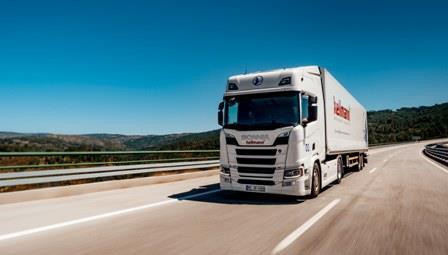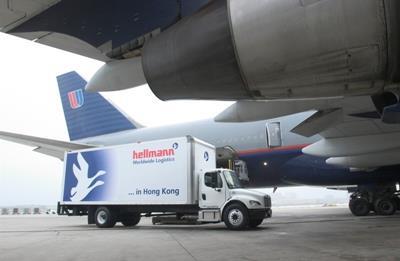When MT last spoke to Hellmann UK MD Markus Fellmann back in 2021, the company was emerging from a management restructure and the Covid-19 pandemic in much better shape than five years earlier when the business was loss making.
Hellmann Worldwide was founded over 150 years ago and is now a fast-growing global multimodal logistics provider with revenues of €5bn (£3.4bn) - up from €2.5bn in just three years.
The UK business, which was formed in 1987, continued its turnaround in the year to December 2021, with turnover up 35% on the previous year to £108m, and ended 2022 with revenue of £140m.
“We successfully turned the corner and were able to add to that success in 2022,” says Fellmann. “It is a very difficult business environment especially for road but we also had a very successful first six months of 2023.
“We have such a good diversity in the UK by geography and industries we work with that, together with our strong culture, we did quite well.”
Hellmann remains strong in key vertical markets including pharma, perishables, automotive, consumer goods and fashion.
Fellmann says that since Brexit and the pandemic the volumes and patterns of international road freight movements have changed.
“Whilst we still do groupage trailers every day, part loads or full truck loads are becoming more important as it allows customers to take advantage of one customs clearance on both sides. I don’t think that process is completely closed yet and we are still seeing a lot of customers building warehouses here.
“So these are still exciting times but overall volumes are softer. Definitely there are fewer transactions as there is more consolidation.”
Same footprint
Despite the increase in revenues over the last couple of years Hellmann retains the same footprint of eight sites in the UK. “We have an agile working environment in the UK and we allow for working from home for days a week where possible,” says Fellmann. “At the same time, some teams just love to be together in the office!”
Although the UK left the EU two and a half years ago, Fellmann says there are still a few hangovers remaining from Brexit.

“For the most part our customers, hauliers and other stakeholders are gelling well together,” he says. “The amount of exceptions we have to deal with are really minimal. A lot of business is repeat so we are getting into a rhythm there. With new customers, if we have the luxury to onboard them we can iron out any issues.
“It is a lot easier now than a year ago.”
Brexit has however softened Hellmann’s business between Great Britain and Ireland.
“Since Brexit it is a lot less,” says Fellmann, pictured. “We used to have Irish freight coming across on our trailers, we would cross dock it in the UK and pass it on. We now see a good portion of the volume going straight onto European trailers and direct into Ireland.
“Our offices and partners in central Europe are still involved but it is not necessarily touching us in the UK. It is starting again here and there and we have some local UK to Ireland traffic but a lot less since Brexit.”
But Fellmann says that the company is seeing an “uptick” in other areas since Brexit.
“One German fashion retailer used to do everything through Germany and distribute into the UK,” he says. “Today they have to pay double duties so this is one area where we are losing the road business but gaining it on air and ocean. Rather than flying or shipping into Germany it now comes straight to the UK.”
Warehouse capacity
The warehouse building boom since the pandemic led to a shortfall in capacity is now starting to ease the pressure on space – in some areas.
“It is a mixed bag,” says Fellmann. “At one point many of our customers had a lot of inventory, especially in fashion and consumer goods. Once that high inventory is depleted we will get back into a regular rhythm.
“But quite a few companies who used to distribute out of continental Europe are now coming to the UK to set up their own distribution. We are capturing a good part of that - we have not yet added another facility but we are very close to doing that. We are growing with our customers but we are not opportunistic where we will go into three 200,000sq ft sheds and hope we fill them eventually.
“The price expectations of shed owners are still very high but we are seeing prices softening now. Maybe there will be an overbuild at some point.”
Back in 2021 Fellmann was full of confidence that the high street would make a comeback against the relentless rise on ecommerce. With Office for National Statistics figures showing that in May 2022, seasonally adjusted internet sales accounted for 26.6% of all official retail sales, compared with 19.7% in February 2020, is he still as optimistic?

“I love the high street!” he says. “But it is challenging based on what we hear from our customers who are often the suppliers of the high street. Certain retailers are still streamlining their portfolios and in the last two years the acceptance for consumers to use ecomm has grown.
“By the same token, as the final mile becomes more expensive you might have at some point more consumers will say ‘you know what, I’m going to the high street to pick it up myself’. Maybe there will be an equilibrium and things might even move in the other direction.”
Supply chain
The rise in online shopping and some persistent supply chain issues are however making it harder for retailers to keep their stories fully stocked with the same wide range of products as before the pandemic, which in turn encourages more shoppers to go online.
Costs of both home and store deliveries will be given another upward twist as the need to decarbonise transport gets ever more urgent. Fellmann says Hellmann has always tried to minimise its impact on the environment.
“Sustainability has always been important to Hellmann,” he says. “Even more so today and it is a major strategic topic for us. When it comes to transport there is still a big discussion about is it sustainable on the cost side.
“We work very closely with our customers who are all in the same boat and we are on the sustainability journey together. We have some electric vehicles on the road in Europe already, but are we completely changing over the entire fleet in the near future – probably not.
“When it comes to airfreight, for example, sustainable aviation fuel adds about $1.50 per kg to the cost. So a portion of the industry’s volumes will be moved using SAF.”
As well as legislation, is Hellmann under growing pressure from customers to cut its carbon emissions?
“100% yes,” says Fellmann. “Not so much here in the UK on the road side – yet. In the international arena, 100%. One household electronics brand is saying ‘if you do not have a robust sustainability plan we will not consider you for RFQs’. Also a lot of the fashion brands that we have been close to for many years are going in that direction.
“It is here to stay and if we want to continue to be relevant we have to go on that journey together. But it will be a gradual process as cost will remain a factor.”
And of course recharging infrastructure for electric trucks is nowhere near ready for companies like Hellmann which double shift their vehicles.

“At Heathrow and Lichfield the trucks do the pick ups and deliveries during the day and trunking at night,” says Fellmann. “You need to allow the down time for that.”
IT investment
It isn’t just zero carbon vehicles that require heavy upfront investment- keeping on top of the day job with a new Hellmann Worldwide IT system is also absorbing cash.
“This is the biggest investment in the company history,” says Fellmann. “We have partially rolled out new accounting software and are rolling out an international transportation management system including an upgrade on the road side. We have numerous digitalisation programmes at different stages running until early 2025.”
The new IT systems are giving customers unprecedented visibility of their shipments, although Fellmann admits it is not quite at the levels achieved by some in the parcels sector.
“We on the road side are not yet where the last-mile courier is,” he says. “Their customers get a ping to say the package is on the vehicle, the driver is en route, it will be there in two hours… We are not quite there yet and the discussion is still very much around the last mile.
“Everything else is visible online – has it cleared customs, is it across the border… But that crunch time – is it half an hour or an hour away – is still a touch point.”
Increased automation of shipment booking and tracking is already reducing the routine day-to-day interactions between Hellmann staff and customers, but it is too soon to say what the impact of artificial intelligence will have on logistics.
A company statement on AI says only it “is a topic we are very closely monitoring and that will certainly fundamentally change the logistics industry”.
It goes on: “Within the framework of adequate regulation, the further development of AI offers an incredible number of opportunities to optimise our services.”
Fellmann concludes: “These are still challenging times, but together with our customers and partners we are ready for this challenge. With a can-do attitude and a teamwork approach we are looking forward to the future.”













